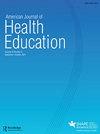经济和人口因素与三个少数民族大学生烹饪自我效能感的关系
IF 0.8
Q4 PUBLIC, ENVIRONMENTAL & OCCUPATIONAL HEALTH
引用次数: 0
摘要
摘要背景有许多社会环境因素会限制大学生的烹饪自我效能,而少数民族往往被忽视。目的了解三个大学少数群体的收入来源和金钱支出与烹饪自我效能感的关系。方法在这项横断面研究中,招募时间为2019年10月至11月,通过Qualtrics平台进行在线调查。共有2817名参与者在线完成了这项调查,提供了烹饪自我效能感(20分制)、金钱支出和财务问题的数据。结果烹饪自我效能感平均为13.5。四个自变量:第一代、国际、年龄和就业状况与烹饪自我效能感呈显著相关(P<0.01)。讨论这项研究支持优先考虑大学少数群体的重要性,有助于了解他们的财政支持,以及他们在管理和优先考虑财务时如何分配。此外,在这些技能的构建方面,每个群体都面临着不同的局限性。转化为健康教育实践本研究的发现对专注于识别影响优先人群的因素的健康教育专家具有重要意义。本文章由计算机程序翻译,如有差异,请以英文原文为准。
Financial and Demographic Factors Associated with Cooking Self-Efficacy Among College Students from Three Minority Groups
ABSTRACT Background There are many socio-environmental factors that can limit cooking self-efficacy among university students, where minorities are usually neglected. Purpose To identify the dynamics of income source and money expenditure with cooking self-efficacy of three university minority groups. Methods For this cross-sectional study, recruitment was between October and November 2019, via online survey through Qualtrics platform. A total of 2817 participants completed the survey online which provided data from cooking self-efficacy (20 points scale), money expenditure and financial issues. Results An average of 13.5 was found as cooking self-efficacy. Four of the independent variables: first generation, internationals, age, and employment status show significative relationship (<0.01) with cooking self-efficacy. Discussion This study supports the importance of prioritizing university minority groups, helping to understand their financial support and how they distribute it when managing and prioritizing their finances. Moreover, each group faces different limitations in terms of what the construction of these skills encompasses. Translation to Health Education Practice The findings present in this study are significant for health education specialist focused on identifying factors that impact priority populations.
求助全文
通过发布文献求助,成功后即可免费获取论文全文。
去求助
来源期刊

American Journal of Health Education
PUBLIC, ENVIRONMENTAL & OCCUPATIONAL HEALTH-
CiteScore
1.70
自引率
10.00%
发文量
36
期刊介绍:
AJHE is sponsored by the American Association for Health Education of the American Alliance for Health, Physical Education, Recreation and Dance. The mission of the American Association for Health Education(AAHE) is to advance the profession by serving health educators and others who strive to promote the health of all people through education and other systematic strategies.AAHE addresses the following priorities •Develop and promulgate standards, resources and services regarding health education to professionals and non-professionals •Foster the development of national research priorities in health education and promotion. Provide mechanisms for the translation and interaction between theory, research and practice.
 求助内容:
求助内容: 应助结果提醒方式:
应助结果提醒方式:


